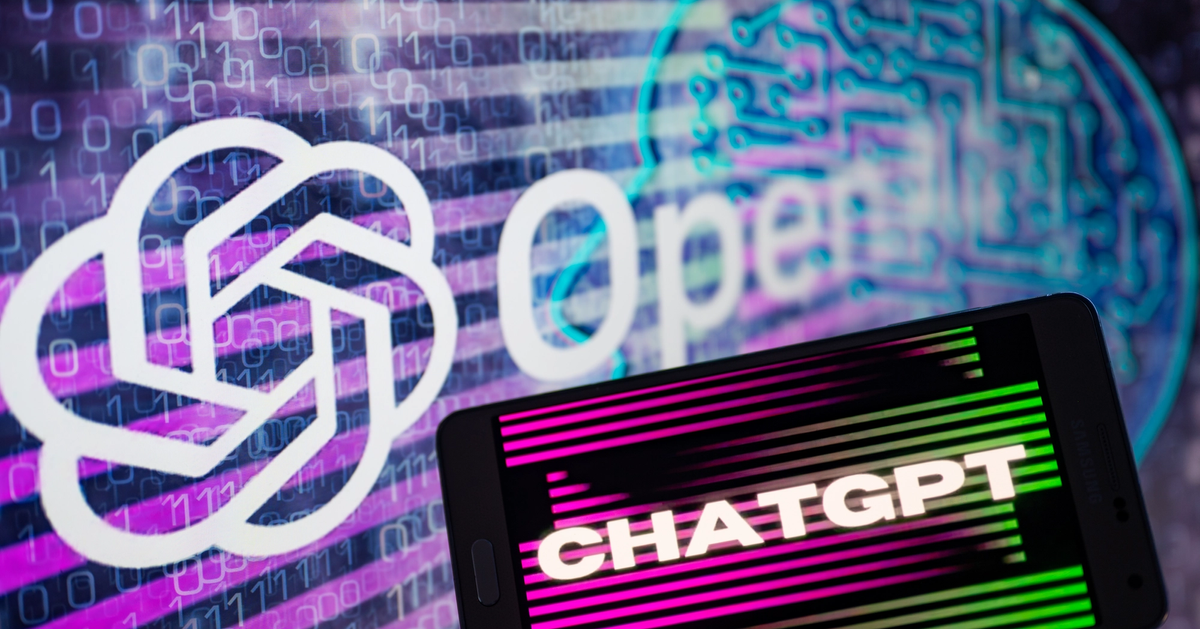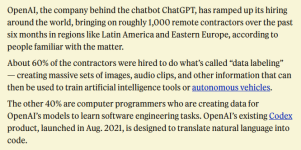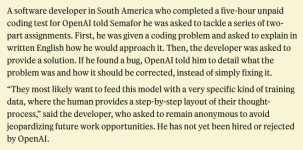Νέα για AI και παρεμφερείς τεχνολογίες και εφαρμογές τους
- Thread starter Thaxll'ssillyia
- Start date
Welcome!
By registering with us, you'll be able to discuss, share and private message with other members of our community.
SignUp Now!You are using an out of date browser. It may not display this or other websites correctly.
You should upgrade or use an alternative browser.
You should upgrade or use an alternative browser.
Thaxll'ssillyia
Φραγκολεβαντίνος μπιφτεκάς
- Joined
- Feb 11, 2021
- Messages
- 2,000
Και η αντισταση θα ειναι οι underground/decentralized linux θυλακεςΆρα η Microsoft θα είναι ο Skynet που θα μας αφανίσει όλους. Δεν μπορώ να πω ότι εκπλήσσομαι.
Thaxll'ssillyia
Φραγκολεβαντίνος μπιφτεκάς
- Joined
- Feb 11, 2021
- Messages
- 2,000
Υπεροχη παρουσιαση για την απειλη που υπαρχει μεσω των αλγοριθμων που βασιζονται στα μοντελα παραγωγης περιεχομενων του GPT-3
AI's Jurassic Park moment

Everybody is talking about systems like chatGPT (OpenAI), Dall-E 2, and Lensa that generate text and images that look remarkably human-like, with astonishingly little effort. Executives at Meta and OpenAI are as enthusiastic about their tools as the proprietors of Jurassic Park were about theirs.
The question is, what are we going to do about it.
The core of that threat comes from the combination of three facts:
• these systems are inherently unreliable, frequently making errors of both reasoning and fact, and prone to hallucination; ask them to explain why crushed porcelain is good in breast milk, and they may tell you that “porcelain can help to balance the nutritional content of the milk, providing the infant with the nutrients they need to help grow and develop”. (Because the systems are random, highly sensitive to context, and periodically updated, any given experiment may yield different results on different occasions.)
• they can easily be automated to generate misinformation at unprecedented scale.
• they cost almost nothing to operate, and so they are on a path to reducing the cost of generating disinformation to zero. Russian troll farms spent more than a million dollars a month in the 2016 election; nowadays you can get your own custom-trained large language model, for keeps, for less than $500,000. Soon the price will drop further.
=====================================
All of this raises a critical question: what can society do about this new threat? Where the technology itself can no longer be stopped, I see four paths, none easy, not exclusive, all urgent:
- First, every social media company and search engine should support and extend StackOverflow’s ban; automatically-generated content that is misleading, should not be welcome, and the regular posting of it should be grounds for a user’s removal.
- Second, every country is going to need to reconsider its policies on misinformation. It’s one thing for the occasional lie to slip through; it’s another for us all to swim in a veritable ocean of lies. In time, though it would not be a popular decision, we may have to begin to treat misinformation as we do libel, making it actionable if it is created with sufficient malice and sufficient volume.
- Third, provenance is more important now than ever before. User accounts must be more strenuously validated, and new systems like Harvard and Mozilla’s human-ID.org that allow for anonymous, bot-resistant authentication need to become mandatory; they are no longer a luxury we can afford to wait on.
- Fourth, we are going to need to build a new kind of AI to fight what has been unleashed. Large language models are great at generating misinformation, but poor at fighting it. That means we need new tools. Large language models lack mechanisms for verifying truth; we need to find new ways to integrate them with the tools of classical AI, such as databases, webs of knowledge, and reasoning.
Thaxll'ssillyia
Φραγκολεβαντίνος μπιφτεκάς
- Joined
- Feb 11, 2021
- Messages
- 2,000
- Joined
- Nov 26, 2012
- Messages
- 16,230
Με το ΑΙ upscalling τι γίνεται έχουμε κανένα νέο; Αυτό θα ήταν σίγουρα κάτι χρήσιμο για όσους θέλουμε να δούμε τίποτα παλιατζούρες.
Thaxll'ssillyia
Φραγκολεβαντίνος μπιφτεκάς
- Joined
- Feb 11, 2021
- Messages
- 2,000

OpenAI has hired an army of contractors to make basic coding obsolete
The company behind ChatGPT now employs around 1,000 people around the world to label data and help OpenAI’s models learn software engineering tasks.


Tl dr Υπαρχει συνδεση μεταξυ του copilot της μικροαπαλης, της χρηματοδοτησης της openAI και -εν μερει- των απολυσεων μονιμων υπαλληλων της
lelos kounelos
Tarrasque
- Joined
- Dec 9, 2012
- Messages
- 15,680
ΦηΜεΣ λενε οτι οι συντακτες του RQ εχουν αντικατασταθει απο ΑΙ. Οι συντακτες πηραν τα χρηματα απο τις διαφημισεις και τα τρωνε στα νησια της καραιβικης σε ποτα, τσιπουρες, γυναικες με ενα ποδι και ντρογκια απο κτηνιατρεια.
Οχι;
Οχι;
Thaxll'ssillyia
Φραγκολεβαντίνος μπιφτεκάς
- Joined
- Feb 11, 2021
- Messages
- 2,000

Gmail creator says ChatGPT-like AI will destroy Google's business in two years
Will it? Only time will tell.
Thaxll'ssillyia
Φραγκολεβαντίνος μπιφτεκάς
- Joined
- Feb 11, 2021
- Messages
- 2,000
Thaxll'ssillyia
Φραγκολεβαντίνος μπιφτεκάς
- Joined
- Feb 11, 2021
- Messages
- 2,000
Thaxll'ssillyia
Φραγκολεβαντίνος μπιφτεκάς
- Joined
- Feb 11, 2021
- Messages
- 2,000

The CNET Fake News Fiasco, Autopilot, and the Uncanny Cognitive Valley
Some things we all need to watch out for.
Ακομη ενα ΠΑΡΑ πολυ ενδιαφερον αρθρο απο τον Gary Marcus, οπου αναφερεται:
- Στην διαπιστωση του Mackworth τον WWII για την (αν)ικανοτητα του ανθρωπου να ειναι προσεκτικος για μεγαλο χρονικο διαστημα ενω θα πρεπει να εποπτευει κατι στο οποιο του εχει εμπιστοσυνη και οτι δουλευει "μια χαρα".
- Για το οτι λογω αυτης της ανικανοτητας, τη περασμενη εβδομαδα οι συντακτες του CNET δεν μπορεσαν να φιλτραρουν 41 απο τα 77 αρθρα που παρηχθησαν απο ΑΙ αλγοριθμους για το εν λογω μεσο και ειχαν σημαντικοτατα λαθη
- Για τις δεκαετιες που προσπαθησαν οι ΑΙ επιστημονες της Google του Larry Page (πριν γινει alphabet) να σπρωξουν στα αμαξια το AI-assistance και την παταγωδη αποτυχια τους και στο τελος την αποδοχη πως ετσι ειναι η ανθρωπινη φυση και να πανε για πληρη ΑΙ αυτονομια στο αμαξι.
(καπου εδω εχουμε και συνδεση αυτης της προσπαθειας με τους μανατζαραιους/μαρκετιστες της Tesla, τη μουφα δημοσιευση του Lex Fridman για το οτι ο Mackworth ελεγε παπατζες και ειναι εφικτη "μια σχετικα υψηλη εγρηγορση σε τετοιες περιπτωσεις", την προωθηση της δημοσιευσης απο τον Ελον Μουσκ, και την εξαφανιση της δημοσιευσης και εν γενει του ιδιου του Fridman απο το επιστημονικο πεδιο του driverless ΑΙ)
Ολες αυτες οι αναφορες μας φερνουν στο ζουμι:
Mackworth was prescient. Automation is a double-edged sword, and there is a kind of uncanny valley* We know perfectly well not to trust lousy systems; and wouldn’t need to pay attention to truly reliable systems, but the closer they get to perfect, the easier it is for mere mortals to space out. The CNET editors probably took a quick look at the large-language model generated prose, and thought it looked good enough; “complacency and over-trust” to their own detriment.
If the autogenerated articles had been riddled with spelling errors and grammatical errors, the editors might not have trusted them. But at a superficial level the essays looked good enough, and so they editors trusted them, and a bunch of false information slipped through.
That’s going to happen a whole lot more this year, with synthetic articles. Too many people are starting to count on systems that inherently can’t keep track of the truth. Few people are likely ever to pay enough attention.
The stakes may get even higher if people start to rely on immature AI—which is all we have got, so far—for legal or medical advice.
We all need to be on our guard.
*Uncanny Valley: Humans will empathise and interact with a cute robot. As it approaches increasingly human-like features, we'll continue to empathise until suddenly, the robot is TOO close to being human. It's almost human!, but not quite, and we are repulsed by this 'uncanny resemblance' because it's almost human but has unnatural features that we are immediately drawn to - and our brain doesn't like it.
Edit: Το εν λογω αρθρο για το CNET

CNET Is Reviewing the Accuracy of All Its AI-Written Articles After Multiple Major Corrections
Big surprise: CNET's writing robot doesn't know what it's talking about.
- Joined
- Nov 26, 2012
- Messages
- 16,230
φιου we are safe for now
Thaxll'ssillyia
Φραγκολεβαντίνος μπιφτεκάς
- Joined
- Feb 11, 2021
- Messages
- 2,000
Το αντιθετο θα ελεγα...καθως προωθειται παντου αυτο το trendφιου we are safe for now
- Joined
- Nov 26, 2012
- Messages
- 16,230
σε αντίθεση με τα "τζάμπα" άρθρα στο νετ, ο πελάτης που θα έχει εμπιστευτεί ΑΙ για λογότυπα και μακέτες και θα έχει βγάλει πινακίδες, κάρτες, φυλλάδια και σκατάκια, όλα λάθος, μάλλον θα τσούξει περισσότερο 
Thaxll'ssillyia
Φραγκολεβαντίνος μπιφτεκάς
- Joined
- Feb 11, 2021
- Messages
- 2,000
ΧΑχαχαχαχαχ...εισαι απιστευτοςσε αντίθεση με τα "τζάμπα" άρθρα στο νετ, ο πελάτης που θα έχει εμπιστευτεί ΑΙ για λογότυπα και μακέτες και θα έχει βγάλει πινακίδες, κάρτες, φυλλάδια και σκατάκια, όλα λάθος, μάλλον θα τσούξει περισσότερο
Tony Corvus
Ancient Red Dragon
- Joined
- Dec 1, 2012
- Messages
- 11,735
Thaxll'ssillyia
Φραγκολεβαντίνος μπιφτεκάς
- Joined
- Feb 11, 2021
- Messages
- 2,000

New AI classifier for indicating AI-written text
We’re launching a classifier trained to distinguish between AI-written and human-written text.
openai.com
Πανω στην ωρα, χτες ανακοινωσε η OpenAI ενα νεο classifier - work_in_progress_φαση καθως εχει πολλα false positives - οπου θα ταγκαρει τα κειμενα που εχουν γραφει με ΑΙ. Φαινεται πως οι πιεσεις του επιστημονικου χωρου καπως αναγκαζουν αυτες τις εταιρειες να αναλαβουν τις ευθυνες τους.
Online statistics
- Members online
- 11
- Guests online
- 26
- Total visitors
- 37
- Robots
- 275
Totals may include hidden visitors.



